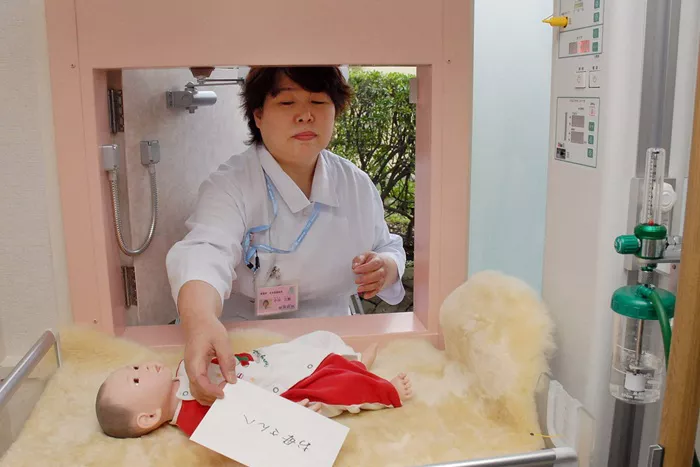A hospital in Tokyo has introduced a “baby hatch,” offering a safe and anonymous way for parents who can’t care for their infants to drop them off. The San-ikukai hospital, located in the Kinshicho district, is the second medical facility in Japan to launch this service.
The “Inochi no Basuketto,” or “Basket of Life,” was set up on Monday with the aim of preventing the abandonment and death of infants. The facility will accept babies up to four weeks old. The hatch is equipped with a motion sensor to alert staff when a baby is placed inside, allowing them to retrieve the infant within 30 seconds.
The hospital will collaborate with authorities to determine the best course of action for the child, including placement in foster care.
San-ikukai hospital’s head, Hitoshi Kato, emphasized that the baby hatch serves as “an emergency and final measure to avoid the abandonment of babies and deaths due to child abuse.” He expressed concern about the continued cases of newborn abandonment and fatal child abuse, stating, “I am committed to creating a society where this project is no longer necessary.”
He added that some mothers and infants still face situations where abandonment becomes an option, resulting in babies being left in unsafe locations such as baggage lockers, parks, or beaches.
To further support women, the hospital has also introduced a “confidential birth system,” allowing women with unwanted pregnancies to give birth anonymously, providing minimal personal information. This system aims to reduce the risks associated with solitary, unsafe deliveries.
Yoko Tsukamoto, a professor at the Health Sciences University of Hokkaido, commented on the situation, stating that the rise in baby hatches is sad but necessary. She pointed to the economic challenges, such as rising food prices, as one of the reasons behind these measures.
Recent reports highlight the financial strain in Japan, with major food producers raising prices on 4,225 products. In February 2024, rice prices saw an 80.9% increase, the largest rise since record-keeping began in 1971.
Japan’s first baby hatch, named Konotori no Yurigago, or “Stork’s Cradle,” was established in 2007 at Jikei Hospital in Kumamoto. Since then, 179 infants have been placed there, some from over 1,000 kilometers away. Jikei’s head doctor, Takeshi Hasuda, has shared that many infants left at the hatch were the result of prostitution, rape, and incest.
Despite facing some criticism, baby hatches are seen by many as a vital option for women in distress. Critics argue that Japan’s societal norms, which place heavy emphasis on family structure, contribute to the stigma surrounding abandoned children. The Japanese family registry system, known as the koseki, requires every birth to be officially recorded, making it difficult for abandoned children to be accepted.
The “confidential birth system” is also designed to assist women with unwanted pregnancies, offering a safe and discreet way to give birth, particularly in a country where societal views on sex, premarital pregnancies, and abortion remain conservative.
Research from 2017 showed that 47% of women who abandoned their infants at baby hatches had given birth at home without medical care, leading to a higher risk of health complications.
Despite efforts by the government to encourage childbearing, the number of births in Japan continued to decline in 2024, reaching a record low of 720,988. At the same time, the death rate increased to a record 1.62 million.
Advocates for baby hatches argue that they provide essential protection for both infants and mothers in a nation struggling with limited support for postpartum women. Experts have called for broader changes to social welfare systems to better support struggling parents, especially in light of Japan’s aging population and declining birth rates.
Related Topics:


